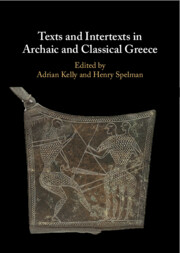Book contents
- Texts and Intertexts in Archaic and Classical Greece
- Texts and Intertexts in Archaic and Classical Greece
- Copyright page
- Contents
- Illustrations
- Tables
- Acknowledgements
- Contributors
- Abbreviations
- Introduction
- Part I Early Intertextuality
- Part II Lyric and Epic
- Part III Drama
- 7 Intertextuality, ‘cf.’, and Fragmentary Drama
- 8 Satyr Drama and the Limits of the Possible
- 9 A Cave with Two Doors
- Part IV Conceptual Contexts
- Bibliography
- Index Locorum
- Index Rerum
7 - Intertextuality, ‘cf.’, and Fragmentary Drama
from Part III - Drama
Published online by Cambridge University Press: 14 November 2024
- Texts and Intertexts in Archaic and Classical Greece
- Texts and Intertexts in Archaic and Classical Greece
- Copyright page
- Contents
- Illustrations
- Tables
- Acknowledgements
- Contributors
- Abbreviations
- Introduction
- Part I Early Intertextuality
- Part II Lyric and Epic
- Part III Drama
- 7 Intertextuality, ‘cf.’, and Fragmentary Drama
- 8 Satyr Drama and the Limits of the Possible
- 9 A Cave with Two Doors
- Part IV Conceptual Contexts
- Bibliography
- Index Locorum
- Index Rerum
Summary
This chapter examines some of the specific methodological challenges of reading dramatic fragments intertextually. It also explores some broader aspects of intertextuality, literary culture, readership, orality, and memory in relation to Greek drama in general. It begins by noting the tendency of commentators and critics to use the formula ‘cf.’ when identifying any sort of similarity between fragmentary texts (or between fragmentary texts and extant ones). But ‘cf.’ on its own is inadequate as an interpretative strategy. This chapter investigates what types of textual relationship are actually being signified by ‘cf.’, and whether it is always possible to know for certain. It also asks to what extent the poor state of the evidence hampers our understanding of textual relations between fragmentary plays, and it raises the problem of how to discern which text is responding to which. These questions are addressed by looking in detail at a number of case studies from works by Aeschylus, Phrynichus, Glaucus, Ion, Sophocles, Euripides, and Aristophanes.
Information
- Type
- Chapter
- Information
- Texts and Intertexts in Archaic and Classical Greece , pp. 169 - 190Publisher: Cambridge University PressPrint publication year: 2024
